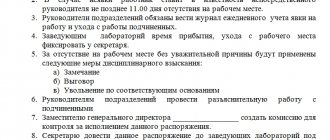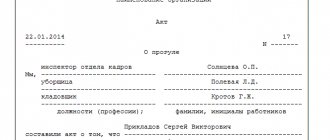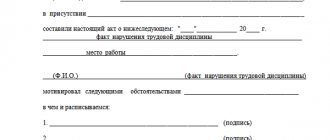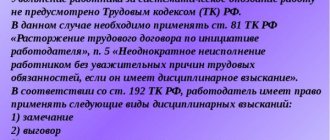What are the disciplinary sanctions?
The list and procedure for applying disciplinary sanctions is determined by Article 192-193 of the Labor Code of the Russian Federation. The following measures are provided:
- comment;
- rebuke;
- dismissal for appropriate reasons.
This list is closed and the organization does not have the right to apply other measures of influence, such as a warning, compensation for losses, disqualification, a reprimand entered into a personal file, a strict warning or punishment in the form of deprivation of part of bonus payments and others.
There is an exception to this rule - para. 3 tbsp. 192 of the Labor Code of the Russian Federation provides that for some categories of citizens other regulatory legal acts may introduce other measures of influence.
Sample of drawing up a report on violation of labor discipline
Today there is no single unified sample act on violation of labor discipline, so representatives of enterprises and organizations can write it in any form . Another common option: when writing an act, use a template approved in the company’s accounting policy.
However, regardless of which method is chosen, the document must indicate a number of certain data:
- date, time, place of drawing up the act;
- Name of the organization.
The main part should include information about the offending employee:
- job title;
- surname, first name, patronymic;
- the most detailed description of the violation committed.
Some additional papers may be attached to the act - for example, an extract from the employee’s working time log or an explanatory note - their presence must also be noted in the document.
Features and types
To figure out whether a warning is a disciplinary sanction or not, let’s look at the law. A warning is a concept from administrative legislation; this type of censure is provided for in Art. 3.4 of the Code of Administrative Offenses of the Russian Federation for legal entities and individuals who have committed minor offenses without negative consequences. Employees of internal affairs bodies and other authorized persons can impose such punishment.
A strict warning is a concept in everyday life, not legal practice. No legal act has recorded such an impact. But it is often used by managers as a way to scold an offending employee.
IMPORTANT!
There is no warning under the Labor Code of the Russian Federation. There is an analogue to it in the code - a remark. It can be done according to Art. 193 Labor Code of the Russian Federation.
How to file a collection
If a misconduct is committed, the employer has the right to announce or issue a warning to the perpetrator, but he is not obliged to do so. The administration has the right to limit itself to indicating the inadmissibility of such behavior in the future. But for those who work under the Labor Code of the Russian Federation, there is no such method of bringing to disciplinary liability as a verbal warning to the employee. If the employer does not plan to bring the perpetrator to disciplinary action, but wants to prevent other subordinates from committing similar acts, he will have to develop his own system for preventing violations. Within the framework of such a system, warning sheets, conversation logs, and team meetings can be introduced. Such activities do not contradict current legislation, but it is necessary to take a very responsible approach to the issue of preserving and distributing personal data. It is better if personal data of employees does not appear in mailings or reviews of the state of official discipline; it is enough to bring information about claims to the attention of the violator himself.
If the law allows you to warn violators, for example, customs officers, then the employer must be guided in this case by the provisions of paragraph 21 of the Disciplinary Charter of the Customs Service. The order in this situation looks almost identical to the previous one, but will contain a reference to the norm of the disciplinary charter.
However, before approving an order to warn an employee, a disciplinary sanction must be formalized in accordance with the procedure approved by law. What need to do:
- Record the circumstances that will allow you to establish the presence of misconduct on the part of the subordinate. This could be a memorandum, some kind of act, a decision of the inventory commission, a report.
- Request clarification from the offending employee. Two working days are given to prepare written explanations. We recommend waiting this period, even if you know that the employee will not write an explanatory note.
- If there is no explanatory note, record this fact in a separate act. If there are, the described circumstances are studied by a special commission, after which the manager decides whether the employee is guilty and whether disciplinary action should be taken against him.
- If the management has decided that a warning should be given for the misconduct, then a sample order to warn the employee, approved in a specific structure, is used (and there is no need to invent anything).
- The last thing to do is to provide the completed document to the employee for review. The person must sign to confirm that they have been notified of the collection.
An order to issue a warning to an employee. as follows:
We remind you once again: if your employee does not belong to the above categories, the proposed sample order to issue a warning to an employee cannot be used, it will be illegal. Such a document will become the basis for filing a complaint with the State Tax Inspectorate or even a lawsuit.
Features for the budget and civil service
Law enforcement officers are warned about incomplete official compliance. Regulatory documents (military regulations, regulations on discipline) do not contain a specific definition of this concept, but directly indicate the possibility of its application to employees. In practice, incomplete professional compliance is usually understood as an employee’s low discipline and failure to comply with legal requirements.
For the military, employees of internal affairs bodies, civil servants and some other categories of workers, the relevant legal acts provide for the following punishments: reprimand, warning, dismissal on appropriate grounds and some others.
Terms of application of punishment
Misdemeanors have statutes of limitations - an employee can be held accountable only within 1 month from the date the violation was discovered. But there are longer periods:
- 6 months from the date of commission;
- 2 years - if violations are identified during financial and economic audits, audits;
- 3 years - if the anti-corruption law is violated.
The calculation of the month from the date of discovery does not include the employee’s vacation and sick leave time.
When to apply
The most common are reprimands and warnings (including about incomplete official compliance) among civil servants. At the same time, a warning about incomplete compliance is a more “heavy” penalty and can negatively affect the fate of the employee when making personnel decisions.
What exactly to apply to the employee - a warning, a reprimand - what sequence of penalties is determined depending on the seriousness of the offense and the degree of guilt of the employee, taking into account the requirements of the organization’s LNA and established practice.
Leave a comment on the document
Do you think the document is incorrect? Leave a comment and we will correct the shortcomings. Without a comment, the rating will not be taken into account!
Thank you, your rating has been taken into account. The quality of documents will increase from your activity.
| Here you can leave a comment on the document “Sample warning of impending dismissal”, as well as ask questions associated with it. If you would like to leave a comment with a rating , then you need to rate the document at the top of the page Reply for |
Design rules
A warning, reprimand, or dismissal must be formalized in compliance with the procedure established by the Labor Code of the Russian Federation and other regulations governing discipline issues.
Schematically, the design procedure can be represented as follows:
- Committing an offense.
- Detection of misconduct.
- Internal inspection, request for explanations from the offender.
- Determining the degree of guilt of the employee and deciding on the need for punishment and its type.
- Application of one or another measure of influence.
For clarity, let’s look at the execution of a collection using an example. Horse riding teacher Petrov Petrovich did not show up for a scheduled show jumping lesson, which put the young students who came to the training and were left unattended in danger.
The procedure for investigating and punishing an employee in this case will be as follows.
Step 1. First, you need to record the fact that the employee is absent from the workplace. For this purpose, an absence from work report or other similar document is drawn up. The basis for it may be an internal memo from colleagues or information received from other persons.
The act might look like this:
Step 2. Then a thorough internal audit is carried out, the purpose of which is to find out all the circumstances of the case and the reasons for what happened. You can interview witnesses and request documents from them and employees that may shed light on the situation.
During the inspection, it is necessary to ask for an explanation from the offending employee (in writing). For this purpose, he is given a special notice.
The employee is given 2 days to provide explanations.
Step 3. The employee must state his vision of the situation, explain the reasons for his action, and also attach supporting documents if necessary.
If he refuses to explain, this is recorded by an act of any form, for example this one.
Step 4. Based on the results of the inspection, a written conclusion can be drawn up (for civil servants it is mandatory), which must be brought to the attention of the employee.
Analyzing the circumstances of the case, management decides on the need to impose a penalty.
In our example, no one was hurt, so we can limit ourselves to making a comment.
Step 5. Since an oral warning cannot be considered a disciplinary sanction, it is necessary to confirm the fact of the penalty with a written order of management in a free form.
The employee is familiarized with the order within 3 days after signing.
IMPORTANT!
An employee can be punished within a month from the moment the offense was committed! You can't do it later.
What to consider when placing an order?
To issue an order to punish an employee for a disciplinary offense, the employer must not only decide on the type of penalty, but also clearly formulate the reason that prompted him to issue this document.
We should not forget that an employee can be punished only by proving his guilt or unlawful actions. At the same time, the company’s management has the responsibility to establish a causal relationship between the employee’s behavior and the violation of his job duties.
The structure of the order should fully allow the employer to impose a penalty on the employee in a motivated manner. An order can consist of 3 parts:
- description of the situation (brief summary of the circumstances of the disciplinary offense);
- justification for imposing the penalty (link to documents: section of the job description, memos, acts, etc.);
- the final part of the order (the employer’s resolution on the type of punishment).
The article “Order on disciplinary punishment - sample and form” will help you draw up an order for punishment for a disciplinary offense.
What consequences await the offender?
The consequences of a warning at work are different and depend on what is provided for by the local regulations of the enterprise. In organizations where it is customary to award bonuses to employees, a necessary condition for receiving funds is that the employee has no outstanding comments or reprimands.
In the public sector, punishments will prevent you from participating in competitions to fill vacant positions, receiving another class rank, etc. If an employee has been repeatedly given a warning before being reprimanded, the next step of management may well be dismissal.
Types of labor discipline violations
It is believed that there are three types of misconduct:
- insubordination to superiors or insubordination (administrative);
- refusal or inability to comply with labor standards (technical);
- neglect of the work and rest schedule (regime).
And if with administrative and regime violations everything is more or less clear: he committed an offense, did not provide any explanation, the management drew up an act, and then punishment followed, then with technical violations the situation is somewhat more complicated.
The fact is that a violation of labor standards must not only be recorded, but also made sure that it was committed due to the employee, and not, for example, outdated or broken equipment.
In order to avoid an unlawfully imposed penalty, employees of enterprises dealing with complex equipment are obliged to promptly report to their superiors in reports about its breakdowns and defects - otherwise, an act of violation of labor discipline may be applied to them.
Sample of official notice of debt
Late utility payments have serious consequences. Owners of apartments and private houses can be evicted from their own homes if they do not pay for electricity for more than six months.
There are several reasons for debt:
- temporary financial difficulties;
- complete loss of ability to work;
- lack of proper control by representatives of utility services;
- controversial situations and litigation, where the second party is the utility service.
If funds are not received into the account on time, the company may apply several collection methods to the defaulter:
- Written warning. If the recipient of the notice pays off the entire debt within the specified period, the case will be closed.
- If there is no payment for a long time, utility services may charge a penalty. The amount of the penalty for failure to fulfill obligations will increase until the debt is repaid. A penalty may be accrued without a corresponding court decision and prior notification to the debtor.
- The violator may also have the service cut off. The defaulter must repay the debt within a month. Company representatives will resume utility services within 48 hours after full payment of obligations and penalties.
- Utility services resort to litigation if there is no payment for a long period - several months or years. ·
There are several ways to send a debt alert:
- "Russian Post";
- by courier;
- personal delivery by an authorized employee.
The document must contain the following information:
- full address, full name of the defaulter;
- amount of debt;
- the amount of the penalty;
- information about further actions in case of refusal to repay obligations;
- proposal to discuss the reason for the delay and further actions with representatives of utility services;
- list of authorized officials of the utility service, their signatures.
It is also permitted to use other information in the notice. For example, utility services may make concessions and cancel previously accrued penalties.
What to do if an employee refuses to sign a document?
If the dismissed employee does not sign the notice, the situation cannot be left to chance. Such actions are unlawful, but the risks of not signing the notice fall on the employer.
In this case use:
- sending by registered mail with notification of receipt of the letter;
- drawing up an act.
When reviewing the drafting of the act, you need to:
- elect a commission of at least three people;
- contact the employee in the presence of the commission;
- read out loud the text of the notice of dismissal;
- offer to put up a painting;
- if the commission refuses to sign, a warning act is drawn up;
- introduces into its content the fact of refusal to sign.
The act has absolute legal capacity and is completely identical to the warning procedure in other ways.
Notifying an employee: when is it necessary and within what time frame?
A notice is an official document that provides information addressed to the employee.
Such a document is drawn up for any dismissal. But if the initiator is the employee, then in this case he is obliged to draw up a resignation letter 14 days before dismissal, with which he notifies the employer that he intends to leave his place.
But notification to the employee is required to inform him about the actions performed by the employer. These include those actions that relate to the property interests of the employee. The reduction affects his interests first and foremost.
A notice of dismissal at the initiative of the employer is mandatory if:
- liquidation of a company or individual entrepreneur;
- the employee has not completed the probationary period (we talked about the nuances of dismissing an employee on a probationary period in this material);
- staff is being reduced;
- the number of employees is being reduced;
- The term of the fixed-term employment contract expires.
A warning is not necessary in cases where the employee:
- did not pass the certification;
- repeatedly violated discipline;
- grossly violated labor discipline or labor safety requirements (read about the specifics of dismissing an employee due to disciplinary offenses here);
- committed theft;
- committed acts that resulted in loss of trust;
- made an unreasonable decision that resulted in damage (for managers);
- submitted fictitious documents during employment.
If the founder of the employer has changed (Article 75 of the Labor Code of the Russian Federation), then the manager, his deputy and the chief accountant may be dismissed without warning. Also, notification is not required for deputies when the main employee leaves (clause 1 of Article 79 of the Labor Code of the Russian Federation).
Warning periods are based on the norms of articles , , 79, 180 and 296 of the Labor Code of the Russian Federation. For different situations they will be as follows:
- Three days' notice is given to: persons who have not completed the probationary period and are employed under a fixed-term contract.
- Seasonal workers are given a week's notice.
- For a month - in case of bankruptcy of a company or individual entrepreneur.
- Two months in advance - employees who are downsizing or downsizing, when liquidating a company or individual entrepreneur.
Compliance with the specified deadlines is mandatory. If they are violated, dismissal can be challenged in court.
Other specific provisions on the timing and forms of warning may be contained:
- in local acts of the company;
- in collective and individual labor contracts.
If these norms and their nuances do not contradict labor legislation or violate the rights of workers, then their provisions must be observed.
Reasons for dismissal on the initiative of the boss
As a rule, any employment contract is concluded for an indefinite period or for a certain period. Any employee is concerned about how much notice he must be given about dismissal if management deems it necessary to reduce staff. If the contract is open-ended, it is by default considered valid until it is terminated at the initiative of the employee or employer. An employer may terminate a contract with a specialist on his own initiative for the following reasons:
- staff reduction;
- elimination of the position in which a specific specialist works;
- systematic failure by an employee to fulfill his official duties;
- liquidation of a company in which a specific specialist works;
- violation by an employee of an employment contract, company charter or labor code.
An employee can leave at his own request, as well as by agreement of the parties. But it is necessary to understand that the boss does not have the right to force a person to leave “of his own free will.”
You should also know that not all categories of citizens are subject to dismissal at the initiative of management. Therefore, in controversial situations, an employee has the right to seek advice from a lawyer. The lawyer will also tell you how much notice the employer must give about dismissal in each specific case.






